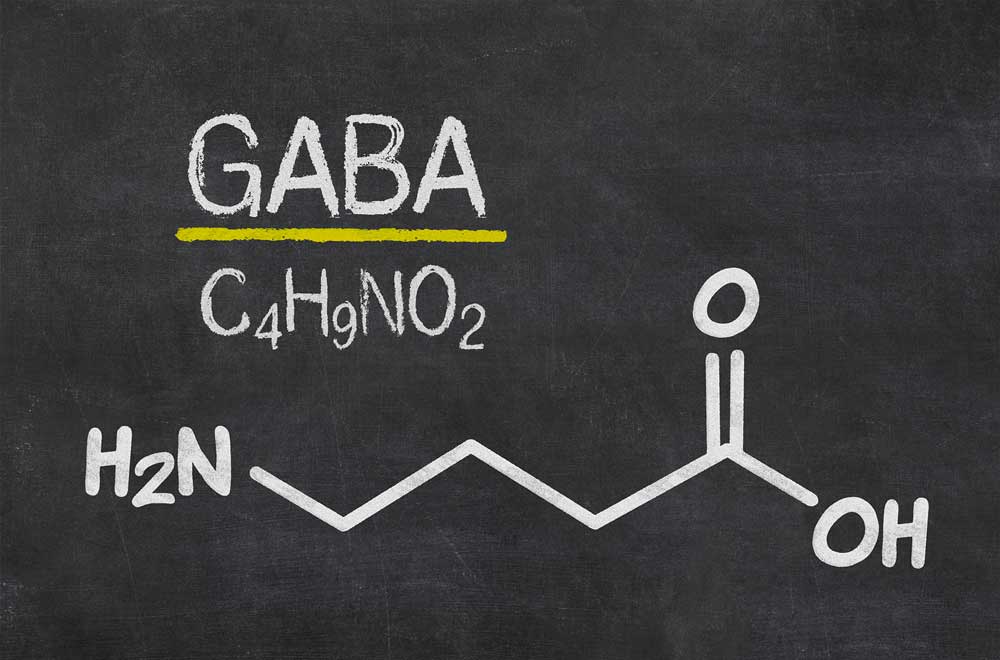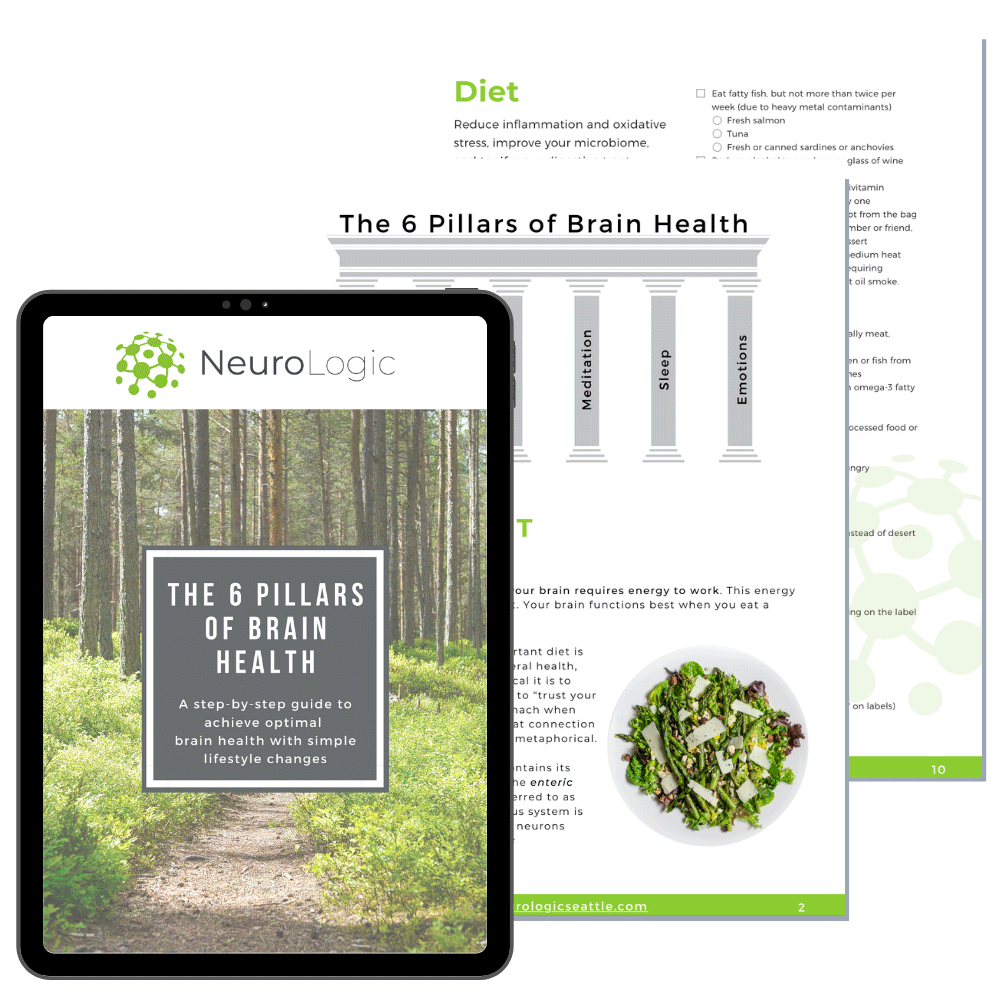Gamma aminobutyric acid (GABA) is a naturally occurring chemical messenger in the brain, and its message is essentially, “relax.” GABA relieves anxiety, improves mood, and helps to reduce stress and insomnia.
Symptoms of GABA Deficiency
There are many things that can reduce the levels of GABA in the body. Certain medical conditions, pharmaceuticals, malnourishment, and a sedentary lifestyle can lower GABA levels and result in:
- Anxiety or panic attacks
- Feelings of overwhelm
- Chronic stress
- Racing thoughts
- Difficulty concentrating
- Memory problems
- Muscle tension
- Headaches
- Sleep problems
If you notice any of the above symptoms, supplementing with GABA or engaging in activities that naturally increase levels of GABA in the body may be beneficial.
Several lifestyle habits have been shown to promote healthy GABA levels, including
- Yoga
- Meditation
- Exercise
To produce GABA naturally, the following key nutrients are required:
- Vitamin B-6, This vitamin is found in red meat, chicken, and fish.
- Glutamate. This amino acid is found in most protein-containing foods such as cheese, milk, mushrooms, red meat, fish, and many vegetables.
- Fermented foods. The good bacteria in our gut can produce GABA for us when we eat fermented foods such as pickles, sauerkraut, kimchi, and kefir.
While the above foods and practices can support healthy production of GABA in our body, supplementing in higher doses will have a much more dramatic calming effect.
Supplementing with GABA will not treat the underlying causes of stress. However, it does seem to directly reduce anxiety, sleep disturbances, restlessness, and muscle tension.
How To Supplement With GABA
If you’re thinking of supplementing with GABA, there are a few important points to keep in mind. GABA works quickly (within 20 minutes) to reduce the body’s stress response. It can also be taken as needed, with or without food.
You should avoid alcohol and benzodiazepines when supplementing with GABA. Since GABA acts on the same receptors as these substances, the combination could lead to symptoms of overdose.
To reduce anxiety and increase feelings of relaxation during a stressful event:
- Start with about 300 mg. If you don’t notice a calming effect within 20 minutes, take an additional capsule.
- You can continue to take one every 20 minutes until you notice a reduction in stress or anxiety. This is how you find an appropriate dose for yourself. The next time you notice stress or anxiety, immediately take whatever dose you require.
To reduce stress and fatigue during problem solving tasks:
- Start with 50 mg. GABA can be very relaxing, so a lower dose is recommended for daytime activities.
To improve quality of sleep and the ability to fall asleep:
- 300+ mg can be taken in the evening.
Side effects of GABA supplementation are rare, but may include stomach upset, nausea, low appetite, drowsiness and fatigue. If you notice any of these symptoms, reduce the dosage.
Recommended GABA Supplements
- GABA Ease by Vitanica – this is a strong GABA supplement used for acute anxiety and sleep disturbances.
- GABA-Pro Calming Effect Chewable by Bioclinic Naturals – this is a lower dose of GABA in an unsweetened, chewable form. It’s good for children or for daytime stress when you need to remain alert.
You can order these supplements from FullScript to ensure the highest quality product: https://us.fullscript.com/welcome/jwendling
Supplements That Support GABA Production
There are several other compounds that help support natural GABA production. If GABA alone isn’t giving you adequate symptom relief, these supplements may be added to help calm anxiety:
- L-theanine
- Inositol
- Magnesium
- Taurine
- Herbs such as passionflower, hops, and valerian root
Sometimes the symptoms we face don’t respond to all our best efforts.
If you or your child is struggling with anxiety, ADHD, compulsive thoughts, sleep issues, or other signs of brain health issues, reach out today for a free consultation.
We’ve helped hundreds of people overcome what felt like insurmountable challenges to regain their quality of life. We’d love to help you, too!
Read More about how we can help.
In health,
Dr. Jessica Wendling
ALWAYS consult your physician before starting any supplements or drugs.
* These statements have not been evaluated by the Food and Drug Administration. The product(s) mentioned in this article are not intended to diagnose, treat, cure, or prevent any disease. The information in this article is not intended to replace any recommendations or relationship with your physician.
Addressing GABA (gamma-aminobutyric acid) deficiency typically involves a multifaceted approach:
Dietary Changes: Include foods rich in glutamate, which is a precursor to GABA, such as whole grains, nuts, seeds, and vegetables. Also, consider consuming foods high in B vitamins, like leafy greens and legumes, which support GABA production.
Supplements: Some individuals may benefit from GABA supplements, although their effectiveness is debated. Consult a healthcare professional before taking any supplements.
Stress Reduction: High stress levels can deplete GABA. Practices like yoga, meditation, and deep breathing can help manage stress.
Medication: In severe cases or specific medical conditions, doctors may prescribe medications that enhance GABA activity, such as benzodiazepines or certain anti-epileptic drugs. These should only be used under medical supervision.
Lifestyle: Ensure adequate sleep, exercise regularly, and limit alcohol and caffeine intake, as these can affect GABA levels.
Consult a healthcare provider for a personalized assessment and recommendations tailored to your specific situation.
Rebuilding GABA (gamma-aminobutyric acid) levels in the brain is a complex process that varies from person to person. There is no fixed timeline for this because it depends on factors like the severity of deficiency, overall health, and individual response to interventions. Dietary changes, lifestyle modifications, and stress reduction practices can start showing positive effects in a matter of weeks to months. However, more severe cases or those requiring medication may take longer. It’s essential to work with a healthcare professional who can monitor progress and adjust treatment as needed to ensure GABA levels are being effectively rebuilt.
The timing of GABA (gamma-aminobutyric acid) supplementation can vary depending on individual preferences and intended effects. Some people choose to take GABA at night because it may promote relaxation and help with sleep. However, GABA supplements can be taken in the morning or during the day for anxiety or stress management. Timing should be based on your specific goals and how GABA affects your body. It’s essential to consult a healthcare professional for guidance, as GABA supplements may interact with other medications or have different effects on different individuals. The optimal timing can vary, and individual responses may differ.


